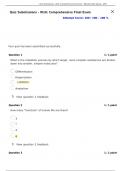BIOL201 (BIOL201)
American Public University
Page 2 out of 121 results
Sort by
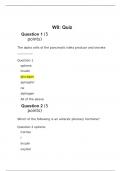
-
BIOL201 Week 8 Quiz 6
- Exam (elaborations) • 17 pages • 2023
- Available in package deal
-
- $20.49
- + learn more
1. Question: The alpha cells of the pancreatic is lets produce and secrete . 2. Question: Which of the following is an anterior pituitary hormone? 3. Question: The two major organ systems that participate in relatively "long distance" communication in order to control and coordinate actions in the body are thesystem and thesystem. 4. Question: Which general type of hormone can easily pass through the cell membrane and into the cytoplasm of the cell? 5. Question: The adrenal gland ...
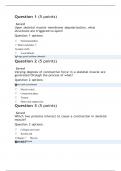
-
BIOL201 Week 5 Quiz 4
- Exam (elaborations) • 8 pages • 2023
- Available in package deal
-
- $20.49
- + learn more
1. Question: Upon skeletal muscle membrane edge polarization, what structures are triggered to open? 2. Question: Varying degrees of contractive force in a skeletal muscle are generated through the process of what? 3. Question: Which two proteins interact to cause a contraction in skeletal muscle? 4. Question: Slow oxidative (SO) muscle fibers: 5. Question: In the Sliding Filament Model of Contraction, act in and myosin filaments slide past one another using what as an energy source? 6. Que...
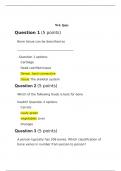
-
BIOL201 Week 4 Quiz 3
- Exam (elaborations) • 14 pages • 2023
- Available in package deal
-
- $20.49
- + learn more
1. Questions: Bone tissue can be described as 2. Question: Which of the following goods is best for bone health? 3. Question: A person typically has 206 bones. Which classification of bone varies in number from person to person? 4. Question: Bones with a cube-like shape can be found in which part of the body? 5. Question: Bones grow in length due to activity in the 6. Question: What unites the bodies of adjacent vertebrae? 7. Question: How many vertebrae are located in the cervical region?...
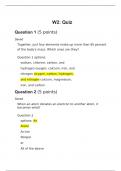
-
BIOL201 Week 2 Quiz 2
- Exam (elaborations) • 16 pages • 2023
- Available in package deal
-
- $20.49
- + learn more
1. Question: Together, just four elements makeup more than 95percent of the body’s mass. Which ones are they? 2. Question: When an atom donates an electron to another atom, it becomes what? 3. Question: What are organic compounds, such as carbohydrates, lipids, proteins, and nucleic acids, within the human body often referred to as? 4. Question: The characteristic that gives an element its distinctive properties is its number of what? 5. Question: Which of the following is NOT a part of th...
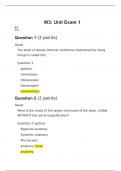
-
BIOL201 Week 3 Unit Exam 1
- Exam (elaborations) • 32 pages • 2023
- Available in package deal
-
- $30.49
- + learn more
1. Question: The state of steady internal conditions maintained by living things is called this. 2. Question: What is the study of the larger structures of the body, visible WITHOUT the aid of magnification? 3. Question: Which organ system is responsible for producing sex hormones and producing milk for an infant? 4. Question: Which organ system is responsible for enabling movement and helping to maintain body temperature? 5. Question: What is the metabolic process whereby smaller, simpler m...
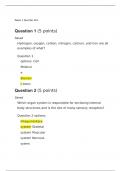
-
BIOL201 Week 1 Quiz 1
- Exam (elaborations) • 16 pages • 2023
- Available in package deal
-
- $30.49
- + learn more
1. Question: The state of steady internal conditions maintained by living things is called this. 2. Question: What is the study of the larger structures of the body, visible WITHOUT the aid of magnification? 3. Question: Which organ system is responsible for producing sex hormones and producing milk for an infant? 4. Question: Which organ system is responsible for enabling movement and helping to maintain body temperature? 5. Question: What is the metabolic process whereby smaller, simpler m...
BIOL201 W16 Cumulative Final Exam
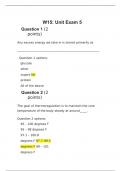
-
BIOL201 Week 15 Unit Exam 5 (Solved)
- Exam (elaborations) • 31 pages • 2023
-
- $45.31
- + learn more
1. Question: Any excess energy we take in is stored primarily as . 2. Question: The goal of thermoregulation is to maintain the core temperature of the body steady at around . 3. Question: Which of the following occur(s) very soon after a meal? 4. Question: During the absorptive state, glucose levels are and insulin levels are . 5. Question: Fever increases the body temperature and can induce chills to help cool the temperature back down. What other mechanisms are in place to regulate the b...
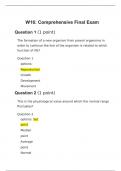
-
BIOL201 Week 16 Cumulative Final Exam (100% Solved)
- Exam (elaborations) • 46 pages • 2023
-
- $64.07
- + learn more
1. Question: The formation of a new organism from parent organisms in order to continue the line of the organism is related to which function of life? 2. Question: This is the physiological value around which the normal range fluctuates? 3. Question: What is the metabolic process by which larger, more complex substances are broken down into smaller, simpler molecules? 4. Question: Hydrogen, oxygen, carbon, nitrogen, calcium, and iron are all examples of what? 5. Question: What are the tiny f...
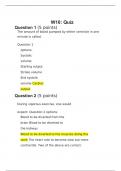
-
BIOL201 Week 10 Quiz 7 (Solved)
- Exam (elaborations) • 16 pages • 2023
-
- $23.94
- + learn more
1. Question: The amount of blood pumped by either ventricle in one minute is called. 2. Question: During vigorous exercise, one would expect 3. Question: Venous return is affected by all EXCEPT: 4. Question: These control the blood flow through a capillary 5. Question: The exchange of substances between the blood vessels and the surrounding tissues can only happen in the . 6. Question: What is the sequence of layers of the blood vessels (veins or arteries) from outside to the inside? 7. Q...

That summary you just bought made someone very happy. Also get paid weekly? Sell your study resources on Stuvia! Discover all about earning on Stuvia



